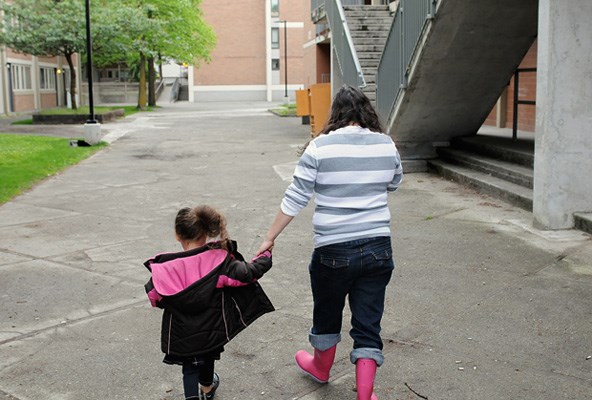B.C. has once again posted the worst child poverty rate in the country after more than a decade of similarly dismal results, a new report shows.
First Call, a child and youth advocacy coalition of more than 90 organizations, said the province’s child poverty rate jumped from 10.5 per cent to 11.3 per cent in 2011, moving B.C. into a last-place tie with Manitoba among the provinces.
The rate is based on Statistics Canada’s after-tax cutoff below which someone is considered to be living in low income. Based on that cutoff, about 93,000 children and youth under 18 lived in low income in B.C. in 2011.
First Call’s report slammed the B.C. Liberal government for refusing to follow the lead of other provinces and adopt a strategy to reduce child poverty.
“In 2013, the B.C. government cannot claim to be ignorant of the abundant evidence of the harm done to children’s health and development by growing up in poverty,” the report said.
Children’s Minister Stephanie Cadieux was unavailable for interviews, but her ministry issued a statement arguing that the government is tackling poverty by building the economy and creating jobs.
“B.C.’s single-digit unemployment rates across every region in the province are a positive sign that we are on track for continued economic growth,” the statement said.
Cadieux’s statement said the growth allows the government to increase the minimum wage and pay for things like social housing and more child care spaces.
But Adrienne Montani, First Call’s provincial co-ordinator, said the government’s argument “doesn’t hold very much water.
“B.C. has led the country in having some of the worst stats for about a decade or so — and that was not always when the economy was doing poorly,” she said.
“It’s not good enough in a very wealthy country and province to say … ‘We’ll just wait for the market system to lift everybody’s boats.’ And it’s not. It’s actually creating greater and greater inequality.”
The report calls for a poverty-reduction plan that sets targets and holds the government accountable; a $10/day child care plan; and minimum wage and welfare rates indexed to cost-of-living increases.
The Federation of Community Social Services of B.C., which is a partner in First Call, said its agencies are stretched to the breaking point trying to help growing numbers of children and families.
“Families are stressed, children are doing without,” said Richard FitzZaland, executive director. “I mean, just look around and if you don’t see it, then you’re living in a bubble.
“Personally, I’m ashamed to live in a society where we allow this situation to exist.”
NDP children’s critic Carole James said everyone will pay the price in higher education, health and justice costs for the Liberals’ refusal to tackle child poverty. “There’s some very specific approaches that could be put in place to begin to address the issue of poverty, but you have to get started and this government doesn’t seem to be willing to even get started.”



